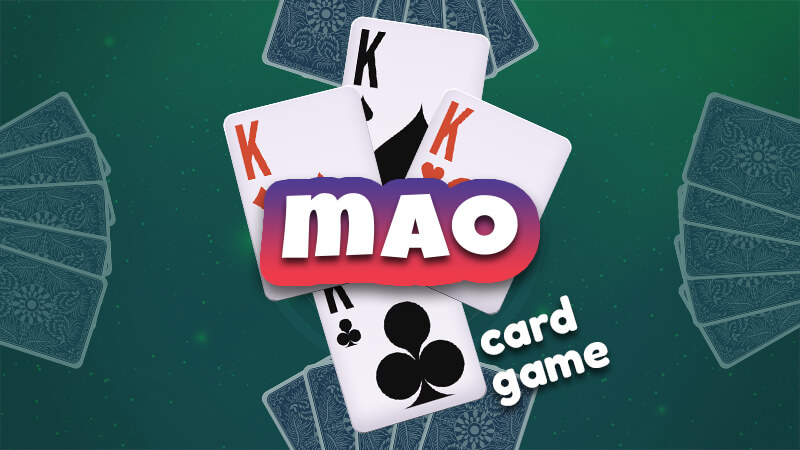Table of Contents
1. Basic Mao rules
The Mao card game is played with 4 or 5 players with one or more decks of cards. Identical to Uno, the objective of the game is to get rid of all the cards in your hand. However, the way it differs from most other similar games is that the players are required to figure out the rules by themselves. That’s why many people call Mao a game and a prank.
Pick a dealer to enforce the rules
Mao rules can vary among different players, and there isn’t a single, universally recognized version of the game. The dealer enforces the rules they are most familiar with. If no one is familiar with the rules of Mao, choose whoever you want. It still makes the game fun.
Skip the next player if someone puts down an ace
An ace in the draw pile indicates that the subsequent player’s turn will be bypassed. If the next player disregards this rule, you have the option to impose a penalty for their continued play.
Take an extra turn if you put down a 2
A 2 in the draw pile gives the option to place down a second card. It’s important that this second card matches either the suit or the numerical/face value of the preceding card.
Pick up a card if the previous player puts down a 7
A 7 obliges the next player to pick up 2 cards. It’s essential that the player who lays down the 7 concludes their turn by saying “Have a nice day.” Also, if the next player places another 7, it’s customary to utter “Have a very nice day” to the succeeding player.
Play in the opposite direction if someone puts down an 8
An 8 functions as a direction reversal. When the game is progressing clockwise and an 8 card is played, the direction of play shifts to counterclockwise. Failing to adhere to this reversal rule upon playing an 8 results in a penalty.
Declare a new suit if you put down a Jack
The Jack changes the suit of the game. After the player plays the Jack, they should announce the new suit. If the original player doesn’t specify a suit, another participant retains the right to proclaim a new suit.
Discard identical cards at any point in the game
This rule is valid only if you play with more than one deck. At any point, even when it’s not your turn, you could dispose of identical cards. However, don’t do this to dispose of your final card, as this is worth a penalty of 5 cards.
2. How to play Mao
Now that the objective and the general details are established, it’s time to sit around the table and play Mao. A quick warning, irritation from some players is very possible.
Deal the cards. Shuffle the deck and deal six cards to each player. Players shouldn’t touch their cards until the dealer officially states that the round has started, otherwise, they’ll be penalized. The rest of the cards remain in the center of the table face down. They are the draw pile. Flip one card from the draw pile to start the game.
Play a card that matches the suit or rank of the center card. Each player must play a card that either matches the number or the suit of the face-up card in the center of the table. Place the card in the pile and it’s the next player’s turn.
Draw a new card if you’re unable to play. If a player has no card of the same suit or rank to play, they must draw from the draw pile. This will end their turn and they would come out of it with more cards in their hand.
Say “Mao” if you only have a single card left. Each player is required to announce when they’re left with just one card in their hand. If they don’t audibly state “Mao” they will be given a penalty.
Players take turns clockwise. Continue the gameplay by moving in a steady, clockwise rotation among the circle of players, unless alterations are introduced. Be aware that specific rules or penalties might lead to a player missing their turn or result in a reversal of the play order.
Thank any player who penalizes you. “Thank you for the penalty” is a required phrase, whenever a player makes a mistake. Failure to verbally thank the dealer results in drawing an extra card as a consequence.
Call “point of order” if you need clarifications. This is a “time-out” for the game. At this point, all players have to put their cards face-down in the play area and should not touch them. If they do, they have to draw a card as a penalty. The point of order is used for breaks and clarification of the rules and penalties.
Come up with a new rule for the next game. Once the game is over, the dealer of the next game should think up a new unspoken rule that would be unique for this game only.
3. Penalties in Mao
In the Mao card game, penalties are imposed on players who break the rules or fail to adhere to the hidden rules set by the dealer. The specific penalties can vary based on house rules or variations, but here are some common penalties that players might encounter:
- Drawing cards. When a player is breaking a rule, the standard penalty is to draw an additional card from the deck. The standard is 1 card, but in some cases, it may be more.
- Skipping turns. A player could be required to skip their next turn as a consequence of breaking a rule.
- Saying “Mao” incorrectly. If a player incorrectly says “Mao” when they don’t have only one card left, they will face a penalty. If the player forgets to say “Mao” they’ll have to draw 1 card. If they say “Mao” when it’s not their turn, they have to draw 5 cards.
- Revealing hidden rules. If a player inadvertently reveals a hidden rule to others, they could have to draw an additional card.
- Putting a Jack on top of another Jack. If a player does this, there is a 3-card penalty.
- Cursing during the game. It’s perfectly normal to feel irritated during a game of Mao, but players are required to express their annoyance in a clean way. If a player curses at any point, they’ll have to pick up an extra card. This is a preset rule, not an unspoken one.
- Improperly playing a card. Playing a card without meeting the required conditions might result in a penalty, where the player could draw 1 or 3 cards, depending on the current rules.
It’s important to note that Mao is a game with evolving and often secretive rules, and the penalties themselves can sometimes be a part of these hidden rules. Since the game can be customized to suit the preferences of the players, it’s recommended to establish and clarify the specific penalties before beginning a game.


